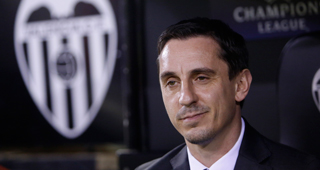“Ask me who I would model myself on as an aspiring coach,” then Sky Sports TV pundit Gary Neville wrote last month in his column, “and in a flash I would give you the name of Mauricio Pochettino.” Less than a week later, Gary Neville was no longer an aspiring coach, set to put his version of Pochettino-ball in place at Valencia.
Neville remade himself from Manchester United everyman to thoughtful soccer commentator, but as Jose Mourinho eloquently observed, he “can’t stop the video and touch the screen”. Of course, Neville would understand the massive difference between intelligent analysis of a match after the fact and influencing a game while it’s still in play. And as Mourinho knows well, there is the human factor that takes a life of its own off screen, featuring new ways to motivate players and keep locker room unity. One reason noted for Chelsea’s struggles this season that led to his dismissal was his obsession in proving TV pundits wrong, thus proving that all things eventually lead back to television.
The biggest loss is YouTube’s soccer commentary community. Neville’s insights regularly clocked in six figure views, with comments focused on his rare level of analysis. Along with his online writing, his public insights make Neville perhaps the very first manager of the social media age. We can project how Valencia will play under his watch: a high press, passion, winning with youth - the signature hallmarks of the modern game.
How do we know this? That’s what he wrote he would do if he ever found himself as a manager. Pochettino was his favorite manager (although he called Mourinho the best manager in world) because he “transformed” Southampton and Tottenham through the use of the youth academy. He was particularly impressed with the trust Pochettino put in Dele Alli. We’d expect Neville to similarly aim for the sky using this model - step forward 19 year old Danilo and 22 year old Andre Gomes at midfield as his own version of Alli and Eric Dier. The archetypes are in the writing - now it’s up to Neville to mold an underachieving Valencia side.
---
The changes were immediate. In his first domestic match last weekend, a 1-1 draw away at Eibar, Neville started 21 year old Rodrigo De Paul, 22 year old Paco Alcacer, 21 year old Joao Cancelo, and 23 year old Shkodran Mustafi alongside Danilo and Gomes. He also reintroduced Alvaro Negredo into the side as a sub after spending the week prior instilling Negredo with confidence to the press. After all, it was Negredo’s omission from the side that revealed a larger symbol of the club discord that led to Nuno’s resignation.
Off field controversies have surrounded Valencia for most than a decade now, the kind where backroom politics spill onto the field in a way unique to La Liga. Nuno was agent Jorge Mendes’ first client (calling Mendes just an “agent” is like calling a Porsche just a car). Mendes was seen as the backroom broker when Peter Lim - whose relationship with other members of United’s Class of ‘92 combines a mixture of football, nostalgia, and globalization - purchased 70% of Valencia in 2014. Nuno supposedly had lost the all important dressing room when he dropped Negredo for a Mendes client. Taken in this light, Valencia may be the foremost example of how a soccer club is run in the modern age. The content is ripe for a “House of Cards” soccer edition (if Mendes is Frank Underwood, who does that make Gary Neville?).
It seems like ages ago that Valencia were made up with the likes of David Silva, Joaquin and Juan Mata in their side. This headline that David Silva joined Manchester City to save Valencia from financial meltdown speaks volumes. With a mid-2000s spine of David Albelda, Carlos Marchena and Ruben Baraja, they were Simeone’s Atleti before Simeone, a side defined by their mental strength, toughness, and skill. That is where they probably should be today - the third team in La Liga, more than capable of clipping Barcelona and Real Madrid in any given season.
Pandora’s box of debt was opened around that same time, and Neville will know there is no such thing as going back to the glory age. Mourinho’s point is taken clearly - Neville cannot press stop on a match and point out flaws - and his definition of success will go further beyond what happens on the field. La Liga is technique and tiki taka wrapped in a riddle of agents, backroom politics, and debt. The short, five-month contract Neville signed could be interpreted as a get out of jail card, an acknowledgement that there’s no such thing as a long-term solution, and only fleeting moments of high pressing and youthful midfielders.
In the meantime, Craig Bellamy was first up to replace Neville’s role on Monday Night Football. He pointed out the influence of Didier Drogba on Premier League strikers, but received criticism for his preference of countryman Aaron Ramsey over Mesut Ozil as Arsenal’s #10. The following week, Frank Lampard’s analysis of how Leicester City beating Chelsea turned out to be his former manager’s last game for his beloved club. The door remains open for Neville’s post-Valencia, post-assistant manager of England return. All the world’s a stage for television punditry.



